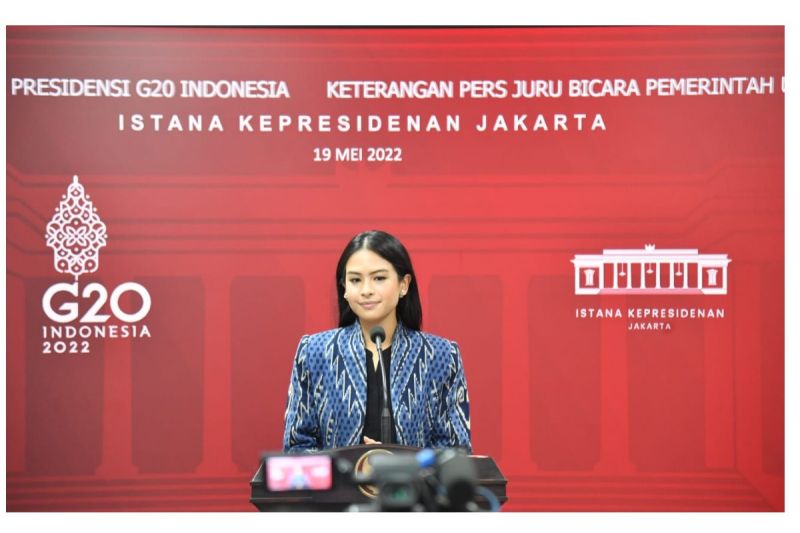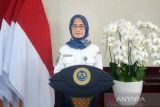
Government's spokesperson for Indonesia's G20 Presidency, Maudy Ayunda. (ANTARA/HO/rst)
G20 member countries supported Indonesia's four priority agendas in the field of education during the Education Working Group (EdWG) Forum, according to government's spokesperson for Indonesia's G20 Presidency, Maudy Ayunda.
"After one year of the pandemic, students experience a decline in learning abilities and knowledge, either specifically or generally," Ayunda stated in a press release on Friday.
EdWG is a working group under G20's Sherpa's Track that examines the factors involved in facilitating or hindering the right to education and the achievement of higher education, also in the context of the pandemic.
Ayunda remarked that EdWG this year highlighted quality education for everyone, digital technology in education, solidarity and partnerships, and the future of the world of work after the COVID-19 pandemic as a common solution to rise from the pandemic.
Three issues also discussed in EdWG included quality education for all through efforts to deal with learning loss.
Related news: G20 EdWG to bolster commitment to recover together: ministry
Research from the Ministry of Education, Culture, Research, and Technology before the pandemic showed that the progress in learning for a year for grade 1 of elementary school was 129 points for literacy and 78 points for numeracy.
After the pandemic, students experienced ability and learning loss equivalent to six months of learning for literacy and five months for numeracy.
"If not addressed immediately, learning loss will affect the overall quality of Indonesian education," Ayunda cautioned.
During the forum, the second discussion pertained to digital technology in education. Technology cannot replace the role of teachers, so the school digitization program should be balanced with increasing teacher competence, especially in the field of mastering information and communication technology.
Teachers with competence in educational technology will be able to accelerate the creation of superior human resources, Ayunda remarked.
Indonesia, through the Ministry of Education and Culture, developed the Merdeka Learning platform to help teachers deliver meaningful learning and provide opportunities for teachers to collaborate.
"This is expected to increase the capacity and skills of teachers," she noted.
Third, the G20 Presidency of Indonesia accentuated the importance of renewing the world's commitment to education through the United Nations Educational Transformation Conference (TES).
Related news: Mutual cooperation basis for transforming education: minister
Related news: RI calls for organizing, rebuilding education system through G20 EdWG
"After one year of the pandemic, students experience a decline in learning abilities and knowledge, either specifically or generally," Ayunda stated in a press release on Friday.
EdWG is a working group under G20's Sherpa's Track that examines the factors involved in facilitating or hindering the right to education and the achievement of higher education, also in the context of the pandemic.
Ayunda remarked that EdWG this year highlighted quality education for everyone, digital technology in education, solidarity and partnerships, and the future of the world of work after the COVID-19 pandemic as a common solution to rise from the pandemic.
Three issues also discussed in EdWG included quality education for all through efforts to deal with learning loss.
Related news: G20 EdWG to bolster commitment to recover together: ministry
Research from the Ministry of Education, Culture, Research, and Technology before the pandemic showed that the progress in learning for a year for grade 1 of elementary school was 129 points for literacy and 78 points for numeracy.
After the pandemic, students experienced ability and learning loss equivalent to six months of learning for literacy and five months for numeracy.
"If not addressed immediately, learning loss will affect the overall quality of Indonesian education," Ayunda cautioned.
During the forum, the second discussion pertained to digital technology in education. Technology cannot replace the role of teachers, so the school digitization program should be balanced with increasing teacher competence, especially in the field of mastering information and communication technology.
Teachers with competence in educational technology will be able to accelerate the creation of superior human resources, Ayunda remarked.
Indonesia, through the Ministry of Education and Culture, developed the Merdeka Learning platform to help teachers deliver meaningful learning and provide opportunities for teachers to collaborate.
"This is expected to increase the capacity and skills of teachers," she noted.
Third, the G20 Presidency of Indonesia accentuated the importance of renewing the world's commitment to education through the United Nations Educational Transformation Conference (TES).
Related news: Mutual cooperation basis for transforming education: minister
Related news: RI calls for organizing, rebuilding education system through G20 EdWG


















